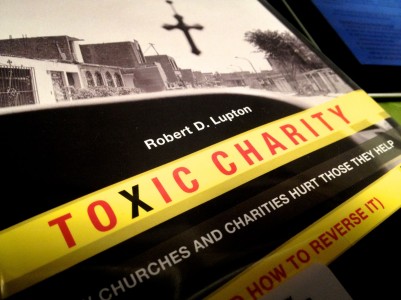BOOK REVIEW: Toxic Charity by Robert D. Lupton

Dori Donnell is the Director of Mercy Ministries at the Vineyard Church in Sugar Land, TX. Having accepted Jesus at the age of three, and somewhere around the age of 20 actually beginning to understand her relationship with God, she knew that she was called to ministry. Growing in the church and working in children’s ministry, as a mom of 3 she loved the values the Vineyard held, and pursued what has turned into a career. Dori has a desire to see the Church aware and in relentless pursuit, knowing that God has equipped and empowered the body to move and make a difference in and for the community. Her passion is for social justice and the wholeness that God has for each of us. 
When it comes to compassion, according to Robert Lupton, our instinct has a shortcoming. “Our memory is short when recovery is long. We respond with immediacy to desperate circumstances but often are unable to shift from crisis relief to the more complex work of long term development.” With technology and the media, we are able to begin to pool resources towards a disaster in a matter of hours, even before a thorough assessment of the damage has been done. Within weeks the country hit, or city, has been immersed in aid being delivered with the best of intentions, and maybe not a perfect understanding of what is truly needed. Americans like to help. Lupton gets this, and in his book ,Toxic Charity, he underlines what help looks like in his experience of urban ministry for over four decades, as well as the unintended harm inflicted by our kindness. I guarantee there was wrestling, as I began to understand the tension behind our attempt to train people to serve versus what those you are attempting to help actually need. To start , he throws an idea out there for a Hippocratic oath of sorts, but in the understanding of compassion and service.It is simply called The Oath For Compassionate Service:
- Never do for the poor what they have (or could have) the capacity to do for themselves.
- Limit one way giving to emergency situations
- Strive to empower the poor through employment, lending, and investing, using grants sparingly to reinforce achievements
- Subordinate self interests to the needs of those being served
- Listen closely to those you seek to help, especially to what is not being said – unspoken feelings may contain essential clues to effective service
- Above all, do no harm
First on the list of good intentions: short term missions trips. Why take them? Several reasons actually: We like helping people. We want to invest in the lives of others. Jesus said to care for the poor, the widow, the orphan. We can bring awareness of a hurting world to those who have only first world problems. All of these are noble of cause, but does it really help people? Lupton brings case after case of ill managed missions trips that did nothing to improve the lives of those they chose to serve. In fact, just the opposite. These trips were created for the people going to help, and not for those they were helping. In the end, the village was left having to make up for the “help”, often causing them to spend resources they did not have to begin with to fix the problem, or they dealt with extraneous paint jobs six times over, or empty buildings erected that the community has no use for. This also points to an imbalance of funding for the mission trip compared to time actually spent on the job and results gained from the trip. Obviously this is not every short -term mission trip ever taken, but Lupton gives great ideas for creating health in these areas. A big part of the answer deals with awareness of what help is actually needed, and resources the village has at the ready. The cost for untrained novices to do work for the village could be much better stewarded hiring skilled labor to get the job done, or training the village to apprentice the skilled laborer. Understanding the work, troubleshooting, and owning the job empowers the community to be equipped and not waiting for the westerners to fix things. We do not want to foster dishonesty or deepen dependency. We want to equip, empower those we are serving, and understand God’s invitation to all involved as we help.
Next Lupton takes on the anatomy of giving. Every year around Thanksgiving and into the New Year we walk through a season of what we believe is goodwill to men. We give turkeys, feasts, toys, parties, food baskets, and all with the understanding that we are showing God’s love. It is a one way understanding of giving, and as Lupton notes, and I have to agree with him: “Wherever there is sustained one way giving, unwholesome dynamics and pathologies fester under the cover of kindheartedness”. Take a look at aid to countries like Haiti, where there has been a deluge of aid, yet the poverty grows, and you know this to be true. The way we handle the urgency of the situation does speak of our hearts being in the right places, but the way we disregard the best help, and instead throw out what we can as a best intention, shows lack of investment in our motive and method. Gratitude quickly devolves to entitlement and dependency settles in.
And then justice meets mercy and things are set right. Lupton points us to Micah where we are to “act justly and love mercy and walk humbly with your God”. Put together justice and mercy and these become a dynamic duo of holistic happenings. But Lupton notes “ Mercy without justice degenerates into dependency and entitlement, preserving the power of the giver over the recipient. Justice without mercy is cold and impersonal, more concerned about rights than relationships.”
So what does this look like for us? A lot of wrestling. We see someone on the streets asking for money. Do we give it to them? Is the money a cheap substitution for what could be given and so desperately needed – a caring community? Would it be better to instead hand the homeless person a card that pays for the bus fare to get to a shelter where they can receive a meal? If you ask five different people, you get five different answers. We understand due diligence is necessary, but we also know that sometimes there is an inner nudge that simply speaks of God wanting us to show His grace to someone in need. Homelessness, Food Pantries, and anything else that would dictate a needs -based relationship requires an understanding of doing best for the one we are serving. We need to begin to understand what equipping looks like for people who know how to work the system. It is better for the recipient to invest time and a small fee for services, than it is for the goods to be handed out for free. Pedagogy of the poor is proven effective and has transformed many a community as Lupton has noted. It requires education and development, which requires a change in perspective and understanding that development takes time, and relationship comes from development. This is especially true if we want to be able to create the ability for microlending to be possible in the USA along with the third world countries. The lack of work ethic caused by a program that nurtures dependency is a major issue, and while entrepreneurship exists, due to the crazy amount of regulations, it is most likely going to be illegal.
So, can we move towards an understanding of what a healthy project for a church looks like in the face of a disaster? Can we begin to educate and empower communities? Can we be better stewards of what God gives us? Yes to all of that. First, we can begin to understand relief as an immediate help, rehabilitation as an overlap of the relief into the enablement and better response for future disasters, and then work towards development, furthering trust and deepening the relationship with the victims, who are now seeing themselves as survivors. We can understand more about Asset Based Community Development and work within the bounds of being one of many stake- holders in a project. We can provide a better understanding of stewardship regarding funds allocated for missions and evangelism, and educate those with the means to truly make a difference in the lives of many. We can help people help. While this book caused a lot of wrestling, it also gave me hope that change is happening, ever so slowly, and as I am able, I can play a part. There is no way to hit on all the points he made, and I am sure there are as many arguments with each point. That is a part of the learning and the growing. My hope is that in reading this, it created a curiosity to delve into. It is in the learning together, as the body, that we become more capable and able to truly be Jesus’ hands and feet.
